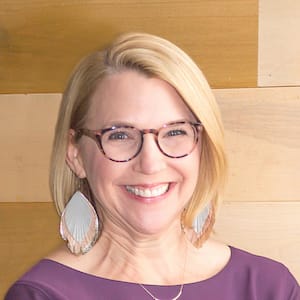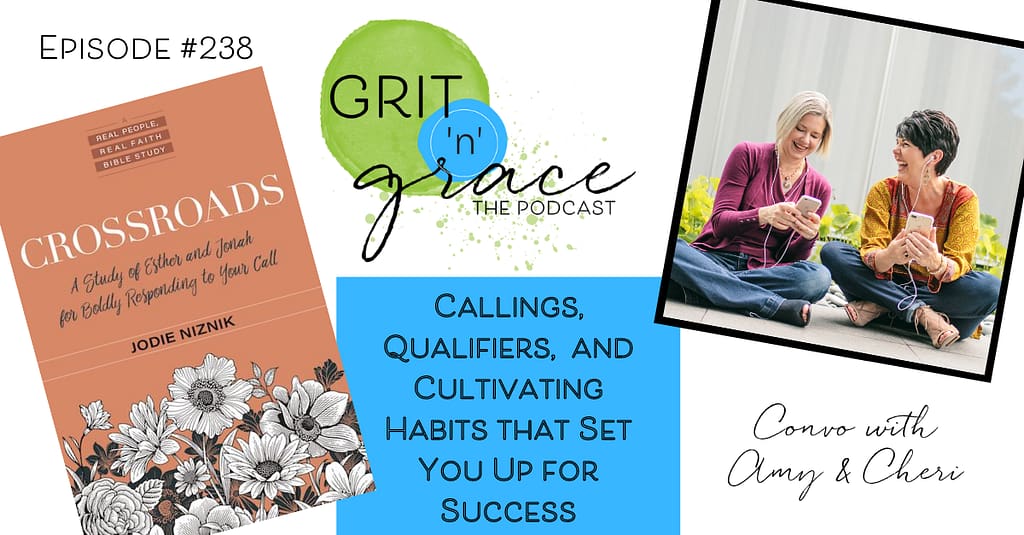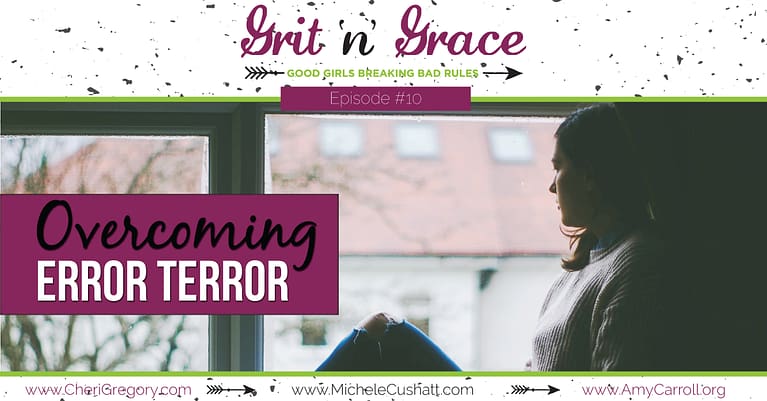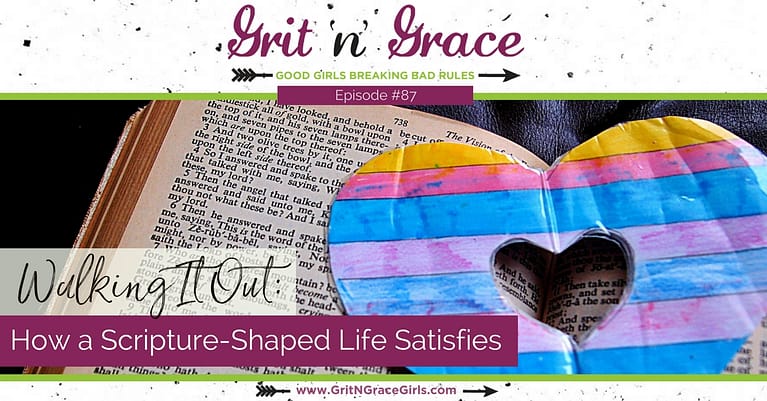Calling can seem like something that’s mystical. Something that’s given only to the special people. But calling is for all of us… if we can overcome feeling disqualified. In this follow-up to last week’s interview with Jodie Niznik, author of Crossroads, Cheri and Amy discuss being used by God despite their failings and give practical practices that set us up to follow God into our assignments. (Also, find out what set Amy on an oppositional defiant path this week!)
(This page contains affiliate links. Your clicks and purchases help support Grit 'n' Grace at no extra charge to you.)
Recommended Resources
- Jodie’s Bible study — Crossroads: a Study of Esther and Jonah for Boldly Responding to Your Call
- Jodie’s website — http://www.jodieniznik.com/studies
- Examen App
Your Turn
- How could quiet and prayer enhance your calling?
- How could fasting enhance your calling?
- What would it look like to put your “disqualifiers” behind you and step fully into your calling?

Downloads
Featured Guest — Jodie Niznik

Jodie Niznik has served in various roles on the pastoral team at her church over the last twelve years.
Jodie’s calling and passion is to equip people to take the next step in their journey with Jesus. She loves to write about and teach scriptural truths in practical and easy-to-understand ways.
You can connect with Jodie at her website, via Instagram, and on Facebook!
Transcript — scroll to read here (or download above)
****
Grit ‘n’ Grace — The Podcast
Episode #238: Callings, Qualifiers, and Cultivating Habits that Set You Up for Success
Cheri Gregory
Okay Amy, I want to play a word association game with you.
Amy Carroll
I love a game!
Cheri Gregory
(Laughs) I am going to name two Bible characters and you’re going to tell me what lesson or lessons you remember learning about each one when you were younger, okay?
Amy Carroll
Okay, I’m ready?
Cheri Gregory
All right, so set your mind back to flannel board days –
Amy Carroll
Mmhmm. She was so beautiful. She won a crown. Kind of like the Miss America contest.
Cheri Gregory
Exactly. Queen Esther was Miss America.
Amy Carroll
After studying Esther this year, I have a little different spin on that but okay, but that’s what I thought as a little girl.
Cheri Gregory
Okay, so character number two is Jonah.
Amy Carroll
Don’t try to run away from God or you’ll get thrown up by a big fish.
(Both laugh)
Cheri Gregory
I love that your focus was being thrown up by the fish, not swallowed by the fish.
Amy Carroll
Oh, kids are totally focused on the throw up, right?
Cheri Gregory
Okay, so I was suspecting that you would come up with this juxtaposition between the heroine and the cautionary tale.
Amy Carroll
Oh, for sure. 100%.
Cheri Gregory
Well, this is Cheri Gregory –
Amy Carroll
– and I’m Amy Carroll –
Cheri Gregory
– and you’re listening to Grit’N’Grace: The Podcast that equips you to lose who you’re not love who you are, and live your one life well.
Amy Carroll
Today we’re processing what we learned from Jodie Niznik, author of Crossroads: A Study of Esther and Jonah for Boldly Responding to Your Call.
Cheri Gregory
At first glance, Esther and Jonah don’t have much in common. Esther is an orphan girl out of place in royal courts, who nonetheless becomes Queen and saves her beloved Jewish people. Jonah is a reluctant prophet who ran as hard as he could from God. And when he finally gave in and his efforts eventually saved his enemies, he did nothing but complain.
Amy Carroll
While Esther and Jonah endured wildly different circumstances and have distinctly singular callings, they were both appointed by God. They were placed in a certain time and space in history. God carried them through unique experiences and gave them specific gifts. Despite their opposite attitudes of willingness, their lives are proof of the great things we can accomplish when we follow God’s call.
Cheri Gregory
In this nine-week inductive Bible study, Jodie Niznik invites you to learn that you too are uniquely equipped and called by God for a particular assignment in a specific time and place. Now you stand at a crossroads and the choice is yours. Will you choose to boldly respond like Esther? Or will you fight your calling like Jonah? With thoughtful questions and practical exercises, Jodie Niznik will gently help you examine your life through the lens of scripture and take brave, bold steps forward into the life you long for.
Amy Carroll
Cheri, this was such an interesting interview to me. So tell us from what we talked about with Jodie what we’re not.
Cheri Gregory
All right. So I had all sorts of ideas. And it really boiled down to one word, you’re – and this is what I’m telling myself, okay. And this may be useful to some of our friends who are listening, but really this was the message that I needed to hear. “You’re not Jonah.”
Amy Carroll
Oh!
Cheri Gregory
And the reason I said this is Jodie said we have to have this deep intimate relationship with the Lord to know how do we respond when we get into these situations? That someone might be convicted one way and somebody else might be convicted a totally different way. And you said something super spiritual. You said “Oh, that’s a very freeing perspective. It frees us from our formulas. It frees us from judgment.” and I thought to myself then, and I still think to myself now, “Yeah, that’s actually very disappointing.” I don’t want to be freed from judgment because it’s so easy to judge. It’s what I do so naturally. I went into our interview going yeah, I totally identify with Jonah. Like I just feel like I tend that direction normally. So if I had to spell out what I mean by you’re not Jonah it would sound like this: “You’re not called to pass judgment on God’s call.”
Amy Carroll
Oh, I get it now. I was like ‘Where are we going?’
Cheri Gregory
So Jonah, he ran away because he didn’t approve of God’s call. You know, you and I talked about living the examined life. I wonder what those three days in the belly of the whale were like. Like he was living the examined life, right?
Amy Carroll
Oh, yeah. Forced to live the examined life. We can choose it or be forced.
Cheri Gregory
And then the other way this came to me is “You’re not called to examine other people’s lives.” Like, we’re supposed to live our own examined life, but I prefer to examine every life except my own. Like, I prefer to watch, you know, watch what other people are doing. Point out their errors. Try to get them, corral them into doing things the right way, aka my way. And if they would all cooperate, I wouldn’t have to examine my life at all ‘cause they’d be perfect.
Amy Carroll
Well, and that’s such a good point because Jonah examined the Ninevites, right, instead of –
Cheri Gregory
Yes he did. He examined God’s call and he examined the Ninevites and he judged them both. So when I say you’re not Jonah that’s what I mean. So what’s your you’re not statement?
Amy Carroll
Well, okay. So I have to tell you something first.
Cheri Gregory
Do tell.
Amy Carroll
When I did show prep today, you had already done yours, and so I decided to go all oppositional defiant on you today, Cheri.
Cheri Gregory
(Laughs) Excellent.
Amy Carroll
Our listeners will know what I mean in just a few minutes. So my not was “You’re not Esther.”
Cheri Gregory
Oh, okay, do tell.
Amy Carroll
Uh huh. I decided to copy you on this, but then I’ll opposition define it in a minute. So from the interview, Jodie reminded us that when we read the book of Esther, we have the advantage of foresight. We know that when Esther walks in front of the king that she is not going to die. But the truth is, and God said it this way, Esther had no idea when she stepped over the threshold to go before the king that she could have got, she really didn’t know – and it was actually likely, I think, Jodie said, because he had actually banished his first queen. So it was she was taking a tremendous risk. And we don’t feel it so much when we read Esther, because we know the end of the story.
So I’m going to go there with something today that is a little bit of a soapbox.
Cheri Gregory
Yes.
Amy Carroll
So Esther did not know that she would not die. But can I say that in the American church that we can pretty much know if we stand up for things that we will not die?
Cheri Gregory
Amy on a soapbox.
Amy Carroll
So there’s a lot of talk right now about persecution in the American church. And I just think we need to be really, really careful. Esther was in a position where she might have died. Many Christians in the world are in positions where they could die for speaking out, but we actually are not. And I’m so proud of my pastor who is completely apolitical, and this isn’t a political statement, that he said a couple weeks ago, you know, we get all up on our high horses right now. And we talked about being persecuted because we have to wear the mask. And that is not actual persecution. I just think we need to be careful about that. And I was trying to think about as I did this, what is the distinction between what we can think about as persecution and actual true persecution, like Esther was facing with Haman, and even her husband.
And I think that if we are experiencing pain from protecting our own rights, that is not persecution. True persecution is experiencing pain from protecting a community’s rights based on scripture. Esther was not going to the king on behalf of herself, she was going to the king on behalf of her community. And I just think there’s an Americanized belief system that we need to kind of grapple with in relation to the story here. So my challenge would be, are we facing some persecution as an American church? We are, we are, but I think we need to pray for the truly persecuted church, those who may give their life for the gospel as Esther could have given her life for God in that situation, places like India, where people are being martyred there.
And the other challenge that I want us to bring out of this is to not be afraid of true persecution. That we shouldn’t get it twisted. That we know that our power comes from God and not a government. And when we know that our power comes from God, we are not afraid of true persecution. When I was in India a few years ago, there was a leader there that really challenged me and he said, “Amy, I want you to tell the American church to stop praying against persecution in India.” And I was like “What?!” and he’s like “Pray for us to be strengthened, but not for the persecution to end.” He said “The blood of the martyrs is the seed of the gospel.” Holy smokes, Cheri, I mean, so we shouldn’t be afraid of persecution, because God gives us strength and power in that.
So, anyway, little aside soapbox.
Cheri Gregory
I love all of that so, so much. And I love that you’re being contrarian today. Especially since I’m about to disagree with you.
Amy Carroll
And then I’m going to disagree with you. Okay, go ahead.
Cheri Gregory
Alright, but I’m not disagreeing with anything you just said. It’s just as we move from lose who you’re not to love who you are, you already know – and maybe our friends who are listening can guess what my you are statement is. My your statement is “You are Esther.” But here’s the way I mean it, okay. There’s a couple ways in which I mean it. “You are Esther.” You are where you are for such a time as this. Whether it’s a big for such a time is this or a small for such a – seemingly small, and you are called to listen to God. That’s what I mean by you are Esther.
And so there were several really practical practices that she shared. And so I just kind of wanted to talk through them back between us and invite our friends who are listening to kind of consider each one of these.
So one of the first things that I noticed that Jodie said is quiet. We need to have this space to be quiet so we can heed the spirits leading in our lives and wait on His timing.
So, Amy, how are you doing with quiet these days?
(Both laugh)
Amy Carroll
I have a mixed relationship with quiet, you know, I have a lot to say, so I have to force myself to be quiet. But I have had the practice of having, you know, in quotation marks a quiet time since I was about 16 or so. And so I missed a day or two here or there. But that is a practice in my life. And it is just time with the Lord. And as I’ve matured, I’ve learned it’s not just about checking things off, read your Bible pray, but it’s also leaving space for the Holy Spirit to speak. How about you?
Cheri Gregory
Well, one of the things I’ve been noticing is that I have some decisions that I need to make, there are some decisions I have made. I’m not teaching this year. And so that has some financial ramifications. And so I found myself ramping up my anxious busyness. But that doesn’t help me make better decisions. It just makes me feel like I’m being productive, and thus a good decision should come out of that. And so realizing I need to schedule in the quiet time to even articulate the question and then listen to the answer.
Like in my life, at least I do feel like God has guided me. Whether – it’s not, probably not usually an audible words, but either an impression or open doors or clearly slamming doors or whatever. But if I’m too busy and too noisy myself, then I’m not going to hear it. So making sure that I even scheduled time to listen. And it’s not necessarily that I’m going to get the answer in that moment. But it’s just the practice of realizing wait, okay, I can’t always be listening to a podcast, I can’t always be talking or whatever it might be.
So the second thing that she recommended was fasting. And so I was just curious. And I know we tend to think of fasting as food. Is there anything other than food that you feel like God has called you to fast from?
Amy Carroll
I mean, I’ve definitely done social media fasts, and I probably needed to do one again, I have found myself just scrolling, scrolling, scrolling, and it’s just such a bad habit. And for me, I have to fast to break it. But I have actually been studying Esther, you know, in the last year a lot. And so I saw fasting in Esther and in another book I was reading and felt called to fast for a family member and a concern that we have in our family. So I fasted once a week for a period of time until I felt like the Lord said, stop. So I think there’s value for me because food is a big stumbling block, I guess, in my life. And so food is a very powerful thing to fast for me.
Cheri Gregory
Yeah, for me, it’ll often be something like sugar, when I’m trying to add some sweetness to my life for I’ve recently discovered crunchy foods are where I let out my anger. And so you know, like heavily salted crackers – me and big Wheat Thins, like I’ve had to fast from those, I swear they put cocaine in them. But that’s a totally different topic for me. But there is some good, there is something about the crunchy –
Amy Carroll
(Laughing) I love a Wheat Thin!
Cheri Gregory
– and so I’m becoming aware of the emotional attachment to certain kinds of foods. And it’s like, well, am I going straight to the cracker box? Or am I, you know, leaning on God to meet the need? Or am I using the food as a crutch?
So how about the practice of examine? Is that something that you’ve ever just spent any time with?
Amy Carroll
I mean, I feel like that’s what we do when we record the podcast. Even the time and the thought that goes into doing show prep forces me to examine things; and then I’m such a verbal processor. So I think examining life through the lens with you is amazing. And so I would encourage our listeners to really think about examining life with a friend. So really, if you’re a verbal processor, it can be very powerful. I hear things coming out of my mouth that I’m like, where did that come from? I didn’t have that thought until I said it, you know.
Cheri Gregory
So true. Well, and I don’t want in any way to say that my next suggestion is going to be a substitute for having a processing partner. But there is actually an app, there’s probably more than one, for the practice of examine and it’s got end of day questions, and sometimes it’s just one or you can do a whole series of them and it’s just a wonderful way to wrap up the day and to be able to look back and do some of those processes. For those of us who are either highly sensitive persons or like you’re an honorary member of the club, since you have one foot in and one foot out, it is so helpful because part of being a highly sensitive person is being a deep processor. And what I find is if I don’t process, all that processing stacks up, and turns into kind of rumination, and that’s not good. And so by having a practice of being able to go through and ask some very intentional reflective questions, it’s just a lovely way to wrap a day down. Anyways.
Amy Carroll
Is the app called examine?
Cher Gregory
I believe so.
Amy Carroll
Okay, everybody’s gonna wanna know.
Cheri Gregory
We’ll put the link in the show notes on our website.
So for me, examine often just naturally leads into the fourth thing Jodie mentioned, which is prayer. And so I was just curious if you have anything new that you’re either doing in terms of prayer, or anything new that’s happening as a result of her, and just even a different way that you’re approaching prayer in the last year or so?
Amy Carroll
Well, there’s something – it’s not new to me, but it’s new every month. I love Kelly Odell Stanley’s prayer calendar. So, so much. She has done a lot of writing about praying outside of the box, and I’m not highly creative. So I really get blinders on sometimes, especially as it pertains to prayer. And she just always brings this new, fresh, creative spark to prayer. And there’s a prompt every day and it keeps me praying for people I don’t even think about sometimes, and so I love that.
Cheri Gregory
You’re making me think of something that our mutual friend Sara Marie does, and it’s called praying through art. And she – I’ve sat through several sessions of this with her, and she’ll give us coloring pages and she’ll guide us in the process of choosing colors to write people’s names in. It’s like a one of these adult coloring pages only she’s drawn it for us and writing people’s names and then coloring over them as we’re praying for them. So we end up with this beautifully colored picture. But early on in the stage we’ve actually got people’s names and we have you know, we might actually have spelled out what we’re praying for them. And then by the end of the I think 15 minutes to an hour the whole thing is colored and then we can post it and it’s a reminder of our prayers.
Amy Carroll
Yeah, I love that idea. I think using the arts in prayer opens a part of us that is usually not open. Even music does that very very much for me. I was having a hard day the other day and our friend Lynn Cowell sent me a beautiful medley of hymns and I sat there, it was like 15 minutes long, and I sat there and listened to it and it opened prayerfully a part of me that had not been opened. It was wonderful.
Cheri Gregory
I love it. For me, it slowed me down. It slowed me down and it really did make it feel like spending a full hour in prayer was an okay thing to do. And I didn’t have to talk the entire time. It was just lovely.
And then the last thing she she mentioned is discerning His voice, God’s voice, from my voice. And she gave the example of God you know, urging her to stop the car and help a woman with their trash can versus her own voice, ‘I got places to go,’ you know, so that one is an ongoing challenge.
Amy Carroll
Well so now I’m going to go oppositional on you because my love who you are is “You are Jonah.”
Cheri Gregory
Our friends who are listening or being are gonna be like “You two.” We didn’t plan this. Honest, we didn’t. Let’s just be clear. I did the show prep first. Amy’s the one who rebelled.
Amy Carroll
Yes, I did. I was like you’re not Esther, you are Jonah!
So one of the things Jodi said is that when you study a character in the Bible, any character you think, oh yeah, God doesn’t just use perfect people. In fact, he uses very flawed people. And that’s given such incredible hope to me. Jonah is the most obviously flawed – if you study Esther, she is also very, very flawed. But each one of us has a call, even though we’re flawed. Now Jodie used the word call; we’ve used the word call; and this – and I want to just pause for a moment to define call because I think that we have these kind of wonky ideas of what a calling is. And it’s not mysterious. And calling is not just for special people, which, we’ve kind of relegated it to that, right, it’s something really woo-woo, woo-woo.
Cheri Gregory
Oh, she has a call!
Amy Carroll
But calling is simply God’s assignment for us in this season. That’s it. It’s what is His assignment for each one of us. We all have a calling in this season of life. Calling shifts according to our season of life as well, and God gives us different assignments over the course of our lives.
So Cheri, you’ve been in this – and as our listeners, you might not have been a writer or a speaker, but maybe you’ve held a title or something that has caused people to treat you as if you were special and different. It’s a very weird feeling, isn’t it? Like when I go and speak, people will act kind of awe-filled. Sometimes I’m like, you guys really don’t know me.
Cheri Gregory
It’s very weird.
Amy Carroll
I mean, you really, really don’t know me. And there was a day not too long ago, that just a couple months ago that I had done something really stupid. And the funny thing is, is I can’t remember what it was because I do so many stupid things.
(Cheri laughs)
Amy Carroll
But this particular thing just really sent me into the pit. And I said, I looked at Barry and I was like, “Do you ever feel like you’re the worst person in the world?” and Barry’s like, “No!” (Laughs) that was funny. But you hear where I was, which I was just feeling like the worst, the worst person who has ever lived.
And so if any of you doubt that Cheri and I, you know, here we are, cheerful, we just interviewed a guest the other day that will be coming up next season. And she said, “You guys are so fun and funny, and you know, life is so light,” and she had a really hard story. And I’m like, girl, If you only knew, right? So listeners, if you only knew. We are all flawed, and we’re all called. Those things are not mutually exclusive.
Cheri Gregory
Okay, say that again, that is a mic drop moment, woman!
Amy Carroll
We are all flawed. And we’re all called. They’re not mutually exclusive.
Cheri Gregory
I feel like we could end right there. But we won’t. I’ll bring on the questions to ask ourselves, and they do relate to those five practices that I walked through from Jodie.
So the first question, when do I need to be quiet and listen? (And for me, it’s more often than not.) Number two, what might God be calling me to fast from just for a season? Number three, how can I use the practice of examine, and we will put a link to the app for those who might be curious. Number four, what is God inviting me to pray about right now? And number five, how do I discern between my voice and God’s call?
Amy Carroll
And so I just used this to create action steps. Number one, choose quiet. Because we live in a noisy world, we have to choose it, it doesn’t just happen automatically. Number two, plan fasting, same thing. You know, I think our body doesn’t want us to fast. we have to plan it. Examine your life is number three. Number four, prioritize prayers. And number five, discern your call.
This last one is interesting. Cheri, you and I have talked about this a lot, that we talk to women in their 70s and their 80s who say “I don’t know what my call is, for my whole life, I don’t know.” So we want to encourage you listeners today that you do have a call and just take some time you really have to choose quiet, plan fasting, examine your life, prioritize prayers, and then you are able to discern your call. God has something for you.
Cheri Gregory
I love it. Thank you action Amy.
And what scripture have you chosen to go along with these episodes?
Amy Carroll
Okay, this is a scripture I have a love/hate relationship with. It’s Esther 4:14. “And who knows, but you have come to your royal position for such a time as this.” One of the things that Lynn and I have talked about as we are writing our Esther study, and I want to just encourage all the listeners read this book, read this Esther study, and then later on you can compare and have different thoughts. I loved listening to what Jodie had to say. I learned so much from her. Different perspectives from where I have been.
But we talked about how so many times people want to put this on mugs and T-shirts. “For such a time as this.” We think it’s like, “And you get a tiara! And you get a tiara! And you get a tiara!”
(Cheri laughs)
Amy Carroll
Right? Because we think ‘Oh, I was created for such a time as this, I am so special.’ But the whole book of Esther, as Jodie told us, it doesn’t have anything to do with us or Esther at all. Even though His name is never mentioned, the whole book of Esther is focused on God. Our calling doesn’t have anything to do with us. It has everything to do with who God. That tiara or that crown belongs firmly on God’s head. And then we get to participate as part of His story.
Cheri Gregory
I love that so much. So, so much.
So for me, the grit in what we’ve been talking about here is going to be a certain amount of the D word that you’re a lot better at than I am, and that’s the word discipline. Like choosing quiet, well, there’s the discipline of biting my tongue and realizing I don’t have to insert myself into it. every conversation or tell everybody everything I know. And you know, especially in fasting, our conversation here has made me realize, you know, probably social media, you know, and there’s just so many things that I realized I easily fall into, and then find myself having been there for a while. And I’m like, yeah, it’s it’s time for me to do the grit of taking stock and making some decisions, and then choosing the discipline to follow through on them. This is recognizing areas in which I’ve fallen into some lazy habits, and it’s time to shore them up.
So what’s the grace for you?
Amy Carroll
The grace is not disqualifying myself because of my flaws. You know, I mean, I can get in this feeling like the worst person in the whole world. And what I want to do is crawl back into bed, crawl into a hole, you know, something, anything other than what God has called me to do. It’s not so different than Jonah running away. And so I need to allow God’s grace alone to qualify me.
Cheri Gregory
Amen. So, so true. Okay, you’ve had a chance to look through Jodi’s Bible study Crossroads, and you noticed a particular feature of it that you really, really found valuable. Tell us a little bit about that.
Amy Carroll
Oh, it has this unique thing that I’ve never seen in a Bible study before. It’s called a practice session. And each day starts with a practice session. So before you ever dive into reading your Bible, or filling in blanks, or doing any reading in the study, it’s a way to take a step in your relationship with God before going into the Bible study for the day.
Cheri Gregory
Sounds super duper practical. Can you give us just one little example?
Amy Carroll
Yeah, like week one was so great, because as Jodie said in the interview, God’s name is never mentioned. And so what she does is she has us go look on a hunt, go on a hunt for God. So for the first week, every day, you’re supposed to write down three to five instances where you noticed God in the last 24 hours. What a great practice to start noticing the hand of our invisible God in our life.
Cheri Gregory
I love that because it will make what I just said was my grit easier to do. Like this is a tool for growing grit is to have something to do to help change the old habit and start developing that new habit. I love it.
Amy Carroll
Absolutely. I just thought it was so practical, a wonderful practice exercise.
Cheri Gregory
It almost sounds fun.
Amy Carroll
It does!
Cheri Gregory
Well friends, we sure hope you’ve enjoyed listening to episode number 238 of Grit’N’Grace: The Podcast as much as we’ve enjoyed making it for you.
Amy Carroll
And we want to say a big thank you to Jodie Niznik for her wonderful book Crossroads: A Study of Esther and Jonah for Boldly Responding to Your Call and Critical Publications for making this episode possible.
Cheri Gregory
Check out our web page at gritngracethepodcast.com/episode238.
Amy Carroll
There you’ll find this week’s transcript, a link to order Crossroads: A Study of Esther and Jonah for Boldly Responding to Your Call, and a link to Jodie’s website, which has some great resources related to this book.
Cheri Gregory
If you’ve enjoyed this episode of grit and grace, would you consider leaving us a review? You’ll find a super simple video showing you how at gritngracethepodcast.com/review.
Amy Carroll
Be sure to join us next week when we’ll be talking with Rachel Lewis, author of Unexpecting: Real Talk About Pregnancy Loss.
Cheri Gregory
For today, grow Your grit,
Amy Carroll
embrace God’s grace,
Cheri Gregory
and as God reveals the next step to live your one life well,
Amy Carroll
we’ll be cheering you on! So –
Both
take it!








